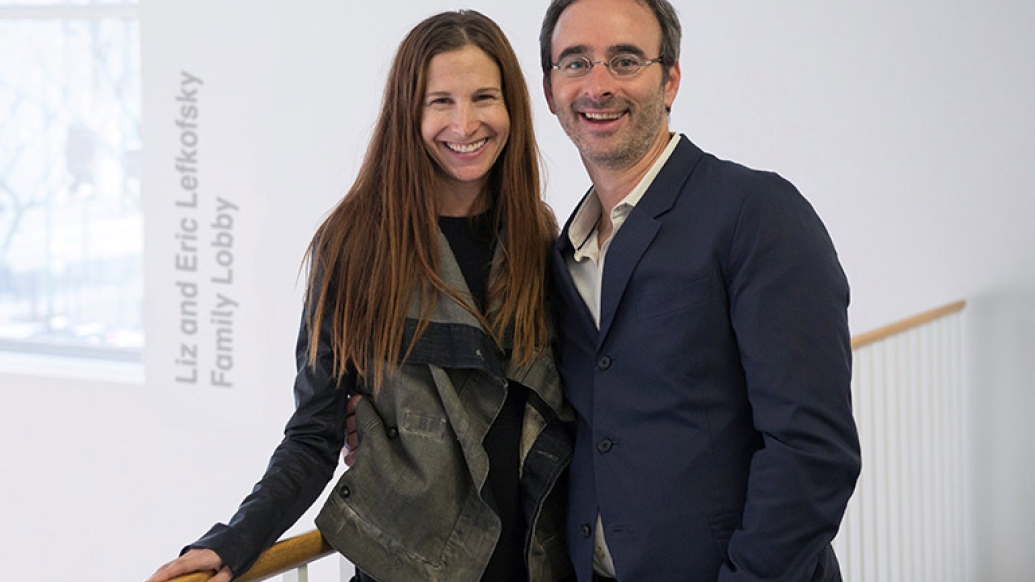
Eric Lefkofsky, AB '91, JD '93, has long operated on the cutting edge professionally. The founder of Groupon, LightBank, and most recently, Tempus — a biotechnology company — approaches philanthropy much the same way: encouraging innovation by investing in transformative ideas.
Through the Lefkofsky Family Foundation, Eric and Liz Lefkofsky have announced a $1 million gift to Michigan Medicine to encourage early-career scientists to pursue high-risk, high-impact projects. This gift leverages and serves as a continuation of their support for groundbreaking research made possible through their gift in 2015. The new pledge not only leverages that support, but expands its scope to include COVID-19 — driving innovation in this area of urgent need.
"We are delighted to be part of these meaningful projects that show such promise in changing the course of diseases considered difficult if not impossible to treat. It is gratifying to help get exciting research like this off the ground, offering better diagnoses, treatments, and potential cures to the many people impacted by these devastating conditions — including members of our own families." —Eric Lefkofsky
Family histories of cancer and heart disease inspired Eric and his wife, Liz, in establishing the Eric and Liz Lefkofsky Innovation Research Fund at Michigan Medicine five years ago. Their goal: to support bold research addressing — and possibly solving— some of medicine's most challenging and unassailable diseases.
With its #1 ranking in research volume among U.S. public research institutions, its focus on the biosciences and precision health, and its numerous opportunities for multidisciplinary collaboration, U-M provided fertile ground for the magnitude of scientific discovery the Lefkofskys wanted to fund. In addition, the awards were geared to take innovative research ideas forward by helping junior faculty generate the pilot data necessary to apply for federal and foundation financial support.
In 2015, the Lefkofsky Awards went to teams — early-career scholars supported by strong mentors — focusing on triple-negative breast cancer, pancreatic cancer, and abnormal heart rhythm conditions. Since that time, tremendous progress has been made.
In their triple-negative breast cancer project, Monika Burness, M.D., with mentors Daniel Hayes, M.D., and Sofia D. Merajver (M.D. 1987, Residency 1991, Fellowship 1993), Ph.D., assessed how these tumors respond to various drugs and why some tumors resist the effects of radiation — refining treatment options for individual patients. Sunitha Nagrath, Ph.D., and mentor Joerg Lahann, Ph.D., explored new methods of detecting pancreatic cancer for earlier and more accurate diagnoses — for better outcomes. Todd Herron, Ph.D., and Sharlene Day, M.D. (Residency 1998, Fellowship 2001), with mentors José Jalife, M.D., and David Pinsky, M.D., gained a better understanding of the relationship between the thickening of heart muscles and abnormal rhythms — identifying potential new effective technologies for personalized treatments.
The successes experienced by the first round of Lefkofsky awardees resonate with Eric Lefkofsky. "We are delighted to be part of these meaningful projects that show such promise in changing the course of diseases considered difficult if not impossible to treat. It is gratifying to help get exciting research like this off the ground, offering better diagnoses, treatments, and potential cures to the many people impacted by these devastating conditions — including members of our own families."
As with the awards made in 2015, proposals related to the new gift will be reviewed by a faculty committee with input from the Lefkofskys. In addition to breast cancer and cardiovascular disease, preference will also be given to projects addressing COVID-19 and neurodegenerative disorders. Kim Eagle, M.D., a director of the Samuel and Jean Frankel Cardiovascular Center, will once again oversee the process — a role he's more than happy to play.
"Eric and Liz Lefkofsky have made another investment in the future of medicine, and I am honored to continue helping advance such promising scientific discovery. Gifts like theirs truly support and embody Michigan Medicine's mission of providing excellence in patient care while offering hope for the future."





